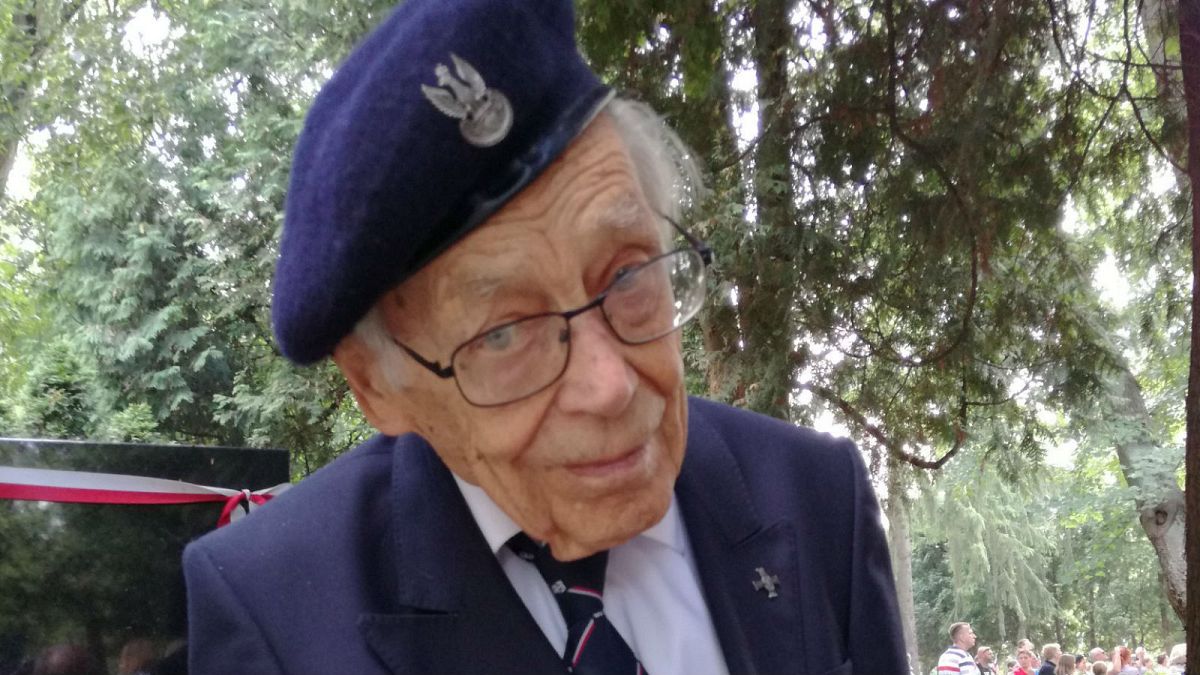It's 75 years since the Warsaw Uprising against the Nazi regime during WWII. Bohdan Dembinski was one of those who took part in the bloody 63-day battle. He told Euronews about the day it all started.
In the early hours of August 1, 1944, 21-year-old Bohdan Dembinski stole across the courtyard outside his Warsaw flat to go and join his section of the Polish Home Army and prepare for what would become one of the most tumultuous and bloodiest battles of the Second World War.
Seventy-five years later and sitting in the very same courtyard, Dembinski looked back on that time and the start of the Warsaw Uprising, a desperate attempt by the Poles to liberate their capital from the savage grip of Nazi occupation.
"I was prepared," the 96-year-old told Euronews. "My feelings were very, very calm. No fear. I didn’t worry about anything. I was curious about what was going to happen."
In fact, he was so relaxed despite knowing that he would soon be going to into battle with an enemy that had ruled occupied Poland with murderous brutality, that he was more concerned about his homemade trousers — "very thin" — and shirt being appropriate for the weather.
Dembinski, a student of building engineering, was soon to join a battle which would see the vastly numerically superior and better equipped German forces defeat the Home Army in bloody fighting — in excess of 200,000 Poles may have died in the battle, and Warsaw was reduced to a shattered and smoking ruin.
READ MORE: Warsaw Uprising: What happened during the WWII insurrection & how is it viewed today?
But, as he prepared to fight, Dembinski learnt that the old adage about "the plan being the first casualty of battle" was true. At the arranged rendezvous point where he met fellow fighters from his section, he got a nasty surprise.
"I was still completely relaxed when I was told to go to the room," he recalled. "So I went into the room where we gathered together and where we were supposed to be given ammunition and guns. But all the material intended for our section had disappeared somewhere on the way so we didn’t have much to start with."
Bereft of the weapons and ammunition needed to carry their orders, a commander told Dembinski’s section to disperse and join other units.
Dembinski went on to survive all 63 days of the Uprising before falling into German hands as one of the 15,000 Home Army soldiers captured following the surrender of Polish forces.
Under the capitulation agreement signed between the Poles and the Germans, the Polish fighters would be regarded as Prisoners of War (POWs) and so fell under the protection of the Geneva Conventions thus sparing them of the prospect of immediate execution. Because of the agreement Dembinski was sent to a POW camp in Germany, which was later liberated by British forces.
But, come the end of the war, he decided to remain in the West.
"A lot of information was coming from Poland and we knew the government was under Russian control and we thought that they were traitors," he said. "I decided not to return to Warsaw."
He travelled first to join the Polish Army stationed in Italy, and then to the UK where he settled down, had a family and got on with life.
But looking back at the days of August 1944 he paints no grand picture of his actions or his motives for taking up arms against the Germans. He was, he says, just a soldier doing his duty.
"We were trained as ordinary soldiers and, when necessary, doing what are leaders tells us; that is all," he said. "At my age, I was supposed to know everything about military duties. I was prepared to do anything whatever I was told to do."
